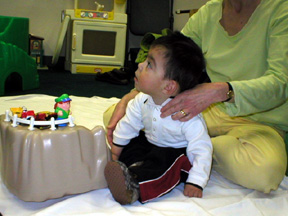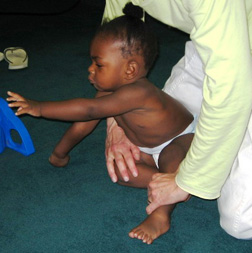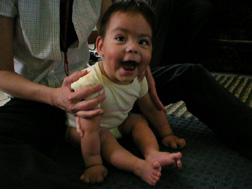 An infant’s first steps are one of the most cherished moments in the life of child, but there is another first physical ability that actually determines whether or not those steps ever happen – the ability to sit up.
An infant’s first steps are one of the most cherished moments in the life of child, but there is another first physical ability that actually determines whether or not those steps ever happen – the ability to sit up.
Sitting independently in an upright position can be an extensive challenge for infants with developmental disabilities. In order to examine the development of this milestone, UNMC’s Munroe-Meyer Institute is seeking applicants for a new study titled, “Investigation of the Development of Sitting Postural Control in Infants with Cerebral Palsy or Motor Delays,” which is funded by the U.S. Department of Education for three years.
“Sitting is the first upright posture achieved in life, with independent sitting occurring by 6-7 months of age in the typical growing child,” said Regina Harbourne, physical therapist in the MMI department of physical therapy and assistant professor in physical therapy education for UNMC’s School of Allied Health Professions. She is a co-investigator for the study, which is a cooperative venture with the University of Nebraska at Omaha Biomechanics lab. UNO’s Nick Stergiou, Ph.D., is the primary investigator.
 “Early postural control in sitting is an important prerequisite for standing balance, and sitting by the age of 2 years is a marker for potential independence in walking in children with cerebral palsy,” Harbourne said. “Once an infant can control the head and the trunk in sitting, the arms are free for exploration and functional activities.
“Early postural control in sitting is an important prerequisite for standing balance, and sitting by the age of 2 years is a marker for potential independence in walking in children with cerebral palsy,” Harbourne said. “Once an infant can control the head and the trunk in sitting, the arms are free for exploration and functional activities.
“Researchers have linked the ability to sit independently to greater success in reaching and maintaining contact with objects and improved eye-hand coordination of infants learning to reach. Poor postural control can limit functional mobility and manipulation during an infant’s development.”
The study has two aims: to better understand the development of independent sitting in typical children, and to identify whether center-based physical therapy or an in-home program provides a better outcome for children who are having difficulty learning to sit.
The program is open to infants, ages 5 months to 2 years, who have been diagnosed with cerebral palsy and are not yet getting in and out of sitting independently; and to infants with motor delays who are not yet sitting and are at risk for developmental delays.
The program will enroll 54 children over the next three years, Harbourne said.
 Infants selected for the study will be followed over an eight-week period and assigned to either a home program group with weekly checks by a physical therapist or a center-based treatment group that will receive twice-weekly direct treatments by a physical therapist. All infants will participate in data collection before the treatment period, after one month of treatment, at the end of eight weeks of treatment and one month post-treatment. There are a total of eight data collection sessions in the motion analysis lab.
Infants selected for the study will be followed over an eight-week period and assigned to either a home program group with weekly checks by a physical therapist or a center-based treatment group that will receive twice-weekly direct treatments by a physical therapist. All infants will participate in data collection before the treatment period, after one month of treatment, at the end of eight weeks of treatment and one month post-treatment. There are a total of eight data collection sessions in the motion analysis lab.
“Sitting is often the first missed or delayed milestone indicating a posture or movement disorder,” Harbourne said. “Currently, available tests used to identify movement problems consider abnormal neurological signs, risk factors that occur before or during birth, scores on developmental screening tests or observations of movement. Such methods are not always reliable in identifying a child’s long-term motor outcome, or in determining a child’s potential for progress with a given motor skill. Standard clinical and neurological testing often fails to identify children who have initial minor problems, but later lag behind in motor skills.”
The effect of intervention on motor development is an issue that needs more research, but measurement tools that are sensitive enough to measure these effects are lacking, Harbourne said. Thus, quantifying postural control during the development of sitting for infants with cerebral palsy or motor delays may help therapists determine the most effective intervention strategies.
For more information about the postural control study or to enroll your child, contact Harbourne or Sandy Willett, physical therapists at Munroe-Meyer, at 559-6415.